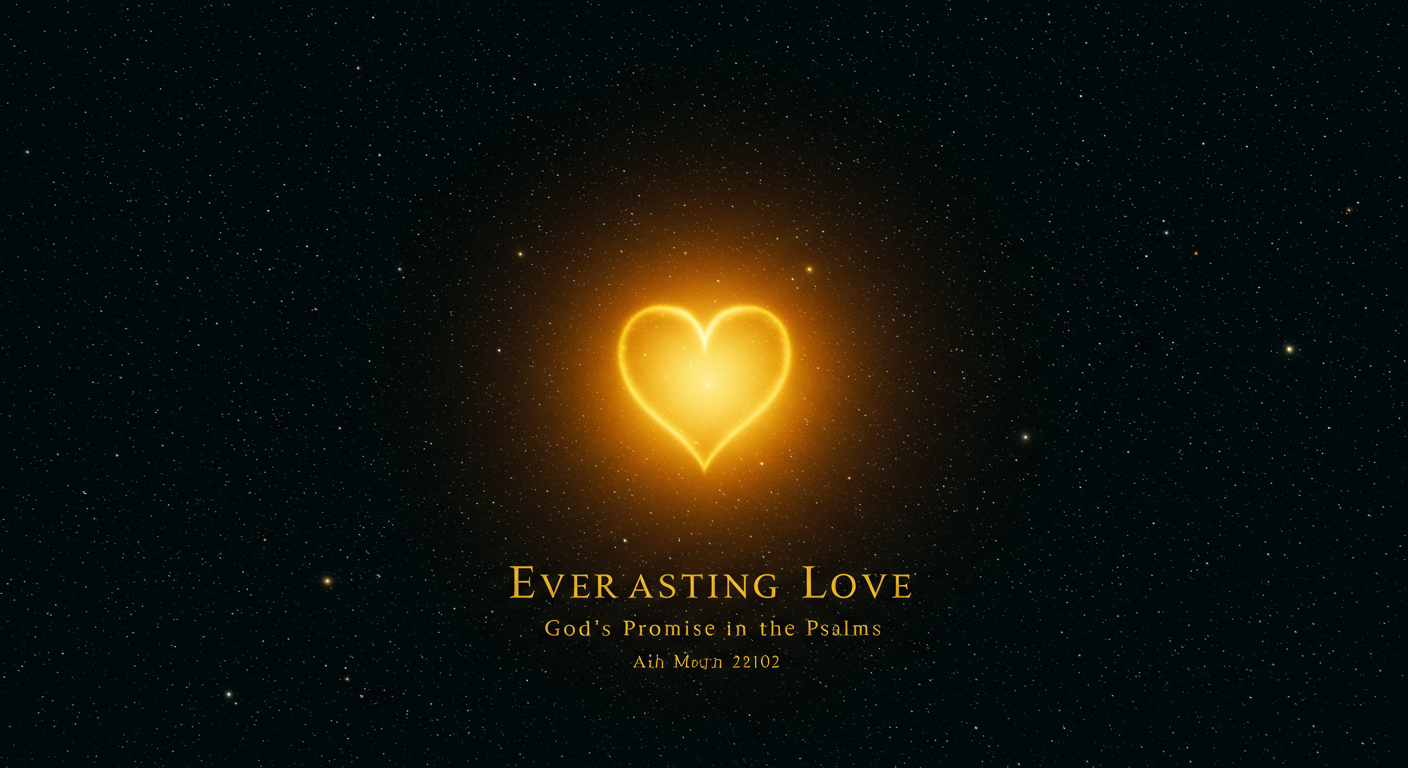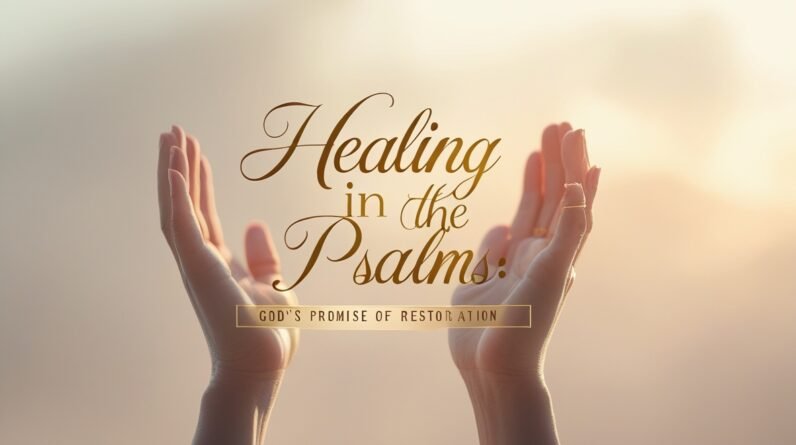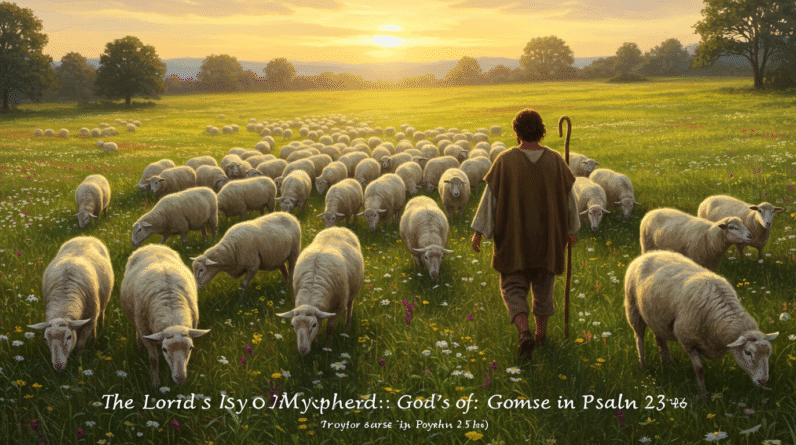God’s Promise Of Refuge In Psalm 46
You’ve probably read Psalm 46 before — maybe at a funeral, in a quiet devotional time, or when life felt like it was falling apart. Its words have comforted millions because they speak plainly about God’s presence in the middle of chaos. In this article, you’ll take a deep dive into Psalm 46, exploring the meaning, context, and life-changing application of God’s promise of refuge. As you read, you’ll see how the Psalm points you back to a God who is near, strong, and actively at work when the earth trembles and the nations rage.
Throughout this study, you’ll find direct links to the biblical text so you can read the verses for yourself. When I reference a verse, I’ll link it to Bible Gateway so you can follow along in the NIV: Psalm 46:1, Psalm 46:2, Psalm 46:3, Psalm 46:4, Psalm 46:5, Psalm 46:7, Psalm 46:10, Psalm 46:11.
Why Psalm 46 matters to you
Psalm 46 is short, but it’s packed with theology and pastoral care. When you’re anxious, it gives you an anchor. When your circumstances look bleak, it gives you perspective. That’s why so many Christians have leaned on this Psalm in times of trial. It doesn’t promise an absence of trouble; it promises a refuge in the midst of trouble. You’ll see that the heart of the Psalm is not a promise of easy living but a declaration of God’s sovereign presence — a truth you can cling to.
The phrase “Psalm 46 promise” captures that assurance. It’s not a silver-bullet guarantee that everything will go your way, but a covenantal assurance that God is your refuge and strength. As you study, ask yourself: How does this promise change the way you face fear, grief, or uncertainty? Your response is the real test of whether the truths of this Psalm live in your heart.
Historical and literary context
To understand Psalm 46, it helps to know a little about its background. The Psalm is part of the Book of Psalms, which is the prayerbook and hymnbook of Israel. Many scholars believe Psalm 46 was written to be sung, possibly during a national crisis or in times of warfare. The Psalm opens with a powerful claim and then paints images of natural disasters and urban collapse, only to bring you back to the calm assurance of God’s presence. It’s structured to create contrast — chaos outside, refuge inside.
Seeing the Psalm in its literary context will also help you appreciate its repeated motifs: God as refuge, the imagery of rivers and cities, and the command to “be still” in the presence of God. Those motifs aren’t accidental; they are carefully placed to lead you from alarm to awe.
The opening promise: God is your refuge and strength
The Psalm begins with a foundational statement about God’s protection: Psalm 46:1 declares that God is your refuge and strength, an ever-present help in trouble. That single verse is a theology of comfort. It tells you two essential things: first, God provides shelter — a refuge — and second, God supplies power — strength.
When you’re honest, you know you need both. Refuge without strength leaves you passive; strength without refuge leaves you exposed. The Psalm promises both. Remember that the “refuge” here is not merely a feeling; it’s a person — the living God who shelters and supports you in times of danger.
This is the heart of the Psalm 46 promise: when the world around you collapses, God is not distant. He is actively present and accessible.
The reality of chaos: storms, earthquakes, and the nations
The Psalm doesn’t sugarcoat life. It depicts real calamity: mountains shaking, waters roaring, cities in upheaval. Psalm 46:2-3 uses vivid imagery to show that even the most stable parts of creation can be disturbed. This isn’t meant to scare you; it’s meant to be honest about the human condition.
By naming the chaos, the Psalm legitimizes your fear. It doesn’t say you’re wrong to tremble; it says you have a refuge to run to when you do tremble. The message is pastoral: acknowledge the storm, and then remember the shelter.
This honest portrayal of danger makes the Psalm 46 promise real and practical. It’s not a platitude; it’s covenantal assurance in the face of violent reality.
The river of God: a picture of life and blessing
One of the most striking images in Psalm 46 is the river that makes the city glad. Psalm 46:4 speaks of a river whose streams make glad the city of God. River imagery in the Bible often represents life, provision, and God’s sustaining presence. Think back to Eden, where a river flowed out to nourish the world. This Psalm borrows that symbolism to tell you that God’s presence brings life even into the midst of destruction.
When you picture the river, don’t just imagine water; imagine renewal. Even when everything around you seems to dry up, God brings streams of blessing. That’s the living, active part of the Psalm 46 promise — God doesn’t merely shelter you; He restores you.
God in the city: a fortified residence of presence
Psalm 46 names the city of God — a place where God dwells and where His people find security. Psalm 46:5 tells you that God dwells within the city and that at His presence the city cannot be moved. This is a powerful promise: your security isn’t in walls made by human hands but in God’s presence.
When you face isolation or feel like you don’t belong, remember that God’s presence creates a city of safety around you. The Psalm 46 promise includes the assurance that no external power can ultimately destroy what God protects.
The Lord Almighty is with us: a sovereign protector
The Psalm shifts from poetic imagery to a declaration of divine sovereignty: Psalm 46:7 says the Lord Almighty is with us; the God of Jacob is our fortress. The Hebrew title “Lord Almighty” (Yahweh Sabaoth) evokes God’s command over heavenly hosts — a comforting reminder that cosmic forces are under His authority.
This declaration is not merely theological; it’s practical. It means the battles you fight aren’t ultimately up to chance. God’s presence is not passive; it is powerful and active. As you trust this truth, it builds your courage and steadies your faith. The Psalm 46 promise is a reminder that God’s sovereignty has pastoral implications: He rules over the chaos you fear.
The command to be still: learning spiritual silence
One of the most quoted lines in the Psalm is the command, “Be still, and know that I am God.” Psalm 46:10 It’s a call to spiritual stillness and recognition. Being still doesn’t mean doing nothing; it means stopping your frantic striving and acknowledging God’s reign.
When you obey this command, you practice trust. You put down the burden of control and let God be God. In a culture that prizes busyness, Psalm 46 invites you to Sabbath listening — to stop and attend to God’s presence. That discipline cultivates peace, even when circumstances remain challenging.
The Psalm 46 promise is not merely rescue from danger; it’s training in dependence. You learn to still your heart and rest in the fact that God is God.
Worship as response: the role of praise in trouble
Psalm 46 moves you from fear to worship. After the vivid depictions of chaos, the Psalm ends with praise and assurance. Psalm 46:11 reiterates that the Lord Almighty is with you, and again invites you to rest in that truth. Worship is the natural response when you recognize God’s presence and protection.
When you worship in the middle of hardship, you shift attention from the problem to the problem-solver. Worship doesn’t ignore reality; it reorients your heart. That reorientation is a spiritual strategy: it moves you from panic to perspective.
Remember that worship is a means of grace. It strengthens your trust muscles. The Psalm 46 promise becomes more than an idea when you respond with adoration and surrender.

Practical application: living under the Psalm 46 promise
How do you live out the Psalm 46 promise in practical ways? Here are a few pastoral suggestions that feel like Rick Warren-style application, aimed at ordinary daily life. First, cultivate a habit of prayerful presence. When a crisis hits, pause and pray, acknowledging God as your refuge. Second, practice spiritual stillness — brief daily times where you stop and recognize God’s sovereignty. Third, anchor your decisions in God’s Word and community rather than in anxiety.
You can also create practical routines: memorize key phrases from the Psalm, rehearse God’s attributes, and share your worries with trusted friends who will pray with you. Living under the Psalm 46 promise means you don’t pretend troubles aren’t real; you face them with God at your side.
How the church has used Psalm 46 historically
Throughout church history, Psalm 46 has been a hymn of resilience. Martin Luther famously took comfort from verse 10 — “Be still, and know that I am God” — during times of national and ecclesiastical trials. Pastors and worship leaders have set this Psalm to music and used it in liturgies of comfort. That historical use shows you that the Psalm’s themes are timeless: when people confront catastrophe, they sing about God’s presence.
This historical trajectory reinforces the Psalm 46 promise as a communal truth. It’s not just for your private devotion; it’s a declaration the church sings together in seasons of trouble.
Pastoral counseling: using Psalm 46 with others
If you care for people in crisis — as a pastor, friend, or family member — Psalm 46 is a gentle tool for counseling. It gives language to fear, imagery for comfort, and a pathway to trust. When someone you love is overwhelmed, you can read a small portion of the Psalm together and ask simple questions: Where do you see the storm in your life? Where can you sense God’s presence? What would it look like to “be still” this week?
Using the Psalm this way avoids theological platitudes and offers a structured way to move from fear to faith. In your conversations, the Psalm 46 promise becomes a shared anchor you both can hold onto.
Theological reflections: refuge, presence, and eschatology
Theologically, Psalm 46 points to deep truths about God’s identity. Refuge language emphasizes God’s covenant faithfulness. Presence language emphasizes Immanuel — God with us. And the end-of-Psalm hope echoes eschatological themes: the final city that will be secure under God’s reign. In this sense, the Psalm not only comforts in the present but also points forward to the day when God’s peace will be unbroken.
When you hold these theological strands together, you see the Psalm 46 promise as both present and future-oriented: God shelters you now and promises a future where unrest is finally subdued.
Personal reflection: making the Psalm your own
Take a moment to personalize the Psalm. Which image resonates with you — the fortress, the river, the unmoved city, or the call to be still? Jot down a short prayer that uses that imagery. For example, you might pray: “Lord, be my refuge when my life feels like an earthquake.” Or, “Pour your river of peace into my anxious heart.” These short prayers turn theology into a relationship.
When you repeat these personal prayers, the Psalm 46 promise moves from abstract doctrine to lived reality — something you carry into your week and into your conversations.
The interplay of grace and action
The Psalm is clear that God is the refuge and strength; yet it also presupposes human response. You aren’t passive under God’s care. You actively run to the refuge, you practice stillness, and you engage in worship. Grace doesn’t eliminate responsibility; it empowers it. That’s a healthy balance: receive God’s grace and then act in faith.
In practical terms, that might mean seeking help when you’re overwhelmed, taking steps to manage stress, and participating in the life of your church community. These are not attempts to earn God’s favor; they are ways to live in the safety God already provides.
When the Psalm feels distant: honest struggles with faith
You’ll have seasons when the Psalm feels distant. Maybe your crisis is prolonged, or your prayers seem unanswered. In those moments, be honest with God. The book of Psalms is full of laments; honesty before God is not a lack of faith. You can say, “Lord, I don’t feel sheltered right now,” and still come under His care. Honesty is a doorway back to trust.
Sometimes the deepest faith emerges from the most honest prayers. When you bring your doubts and pain to God, you’re practicing the very dependence the Psalm calls for.
Teaching children the Psalm 46 promise
If you have children, Psalm 46 can be taught in simple, memorable ways. Use images: a safe fortress for God, a river that makes a city glad, and a call to be quiet and listen to God. Create a short family ritual: read a verse, say a one-sentence prayer, and name one fear and one reason to trust God. These small practices help children internalize the Psalm 46 promise in accessible language.
Teaching the Psalm to kids also helps you articulate the promises for yourself in simpler terms — which is often where authentic faith begins.
Prayer and meditation on Psalm 46
Turn the Psalm into a guided meditation. Read a verse slowly. Pause. Ask God to make the words real to you. For example, read Psalm 46:1 and breathe in the words “refuge” and “strength.” Then read Psalm 46:5 and visualize God inhabiting the city of your heart. These spiritual disciplines aren’t complicated; they’re invitations to experience the Psalm 46 promise in your inner life.
Meditation like this helps you remember that Scripture is meant to be lived, not merely analyzed.
Worship resources and songs inspired by Psalm 46
A number of worship songs and hymns draw on Psalm 46 themes. Singing helps you internalize scripture in a way that study alone cannot. Look for songs that emphasize God’s presence, protection, and the call to be still. When you incorporate those songs into your private worship or communal services, you reinforce the Psalm 46 promise in your heart and in the life of your church.
Music creates memory anchors. When trouble returns, you’ll find yourself humming a melody that brings the Psalm’s truths back into your mind.
The Psalm 46 promise and social justice
Psalm 46 is often read personally, but its language about cities and nations also has social implications. A God who protects and dwells with His people is a God who cares about communities, not just individuals. Justice, peace, and community well-being are part of the broader application of the Psalm. When you work for peaceful neighborhoods, fair systems, and compassionate policies, you participate in God’s restorative work that Psalm 46 celebrates.
So, the promise of refuge has a communal edge: it calls you to care for others, creating spaces where God’s presence can be felt more deeply.

Final encouragement: hold fast to the promise
As you finish this deep dive, remember this central truth: the Psalm 46 promise is not a one-time slogan; it’s a covenantal reality you can lean on repeatedly. When fear rises, remind yourself: God is your refuge and strength, an ever-present help in trouble (Psalm 46:1). When the world shakes, be still and know that He is God (Psalm 46:10). Let these truths shape your prayers, your worship, and your actions.
Trusting God doesn’t always change your external circumstances immediately, but it does anchor your soul. Hold fast to that anchor. The Psalm 46 promise isn’t simply comforting language — it’s a living invitation to live with courage, worship, and hope.
If this study stirred something in you, take one practical step this week: choose one verse from this Psalm, commit it to memory, and let it shape your prayers every morning.
Closing prayer
Lord, help you to rest in God’s presence and to remember His refuge in moments of fear. Let the Lord Almighty be your fortress. Practice being still, and allow the peace that passes understanding to guard your heart. Amen.
Explore More
For further reading and encouragement, check out these posts:
👉 7 Bible Verses About Faith in Hard Times
👉 Job’s Faith: What We Can Learn From His Trials
👉 How To Trust God When Everything Falls Apart
👉 Why God Allows Suffering – A Biblical Perspective
👉 Faith Over Fear: How To Stand Strong In Uncertain Seasons
👉 How To Encourage Someone Struggling With Their Faith
👉 5 Prayers for Strength When You’re Feeling Weak

📘 Jesus and the Woman Caught in Adultery – Grace and Mercy Over Judgement
A powerful retelling of John 8:1-11. This book brings to life the depth of forgiveness, mercy, and God’s unwavering love.
👉 Check it now on Amazon
As a ClickBank & Amazon Affiliate, I earn from qualifying purchases.
Acknowledgment: All Bible verses referenced in this article were accessed via Bible Gateway (or Bible Hub).
“Want to explore more? Check out our latest post on Why Jesus? and discover the life-changing truth of the Gospel!”








